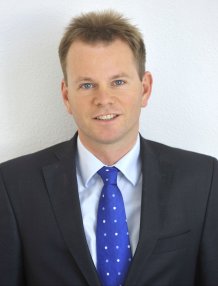Articles

James Pearce
Volunteer in the Spotlight - James Pearce
Volunteer in the Spotlight is a regular feature that highlights the alumni that help current students achieve more. James Pearce (Politics, 1992) is a freelance broadcaster who previously worked for the BBC.
What volunteering activity did you undertake and what inspired you to volunteer your time to help Exeter students?
I ran a live broadcasting workshop for the students. I run an internal training course for BBC radio and TV reporters, and when I was asked if I was interested in speaking at Exeter University I thought it would be fun to give the students some ‘BBC style’ training. I’ve never forgotten the people who helped me at the beginning of my journey in the media, and I’ve always tried to do what I can when I’m asked for advice or assistance. The enthusiasm of younger people when they learn about broadcasting is infectious and reminds me why it is such a special profession
Tell us about yourself and your career journey.
I studied Politics at Exeter, but I spent much of my time at the University Radio Station. I was Station Manager for my final year, and that experience helped me to win a place on the BBC’s news training scheme. I progressed through the ranks at the BBC, working in Plymouth for BBC South West and then being appointed a sports correspondent in London for the national TV and radio news. My career was helped considerably by the announcement on July 6 2005 that London would host the 2012 Olympics. I’d fronted much of the BBC’s news coverage of the London bid and I was appointed the BBC’s Olympics Correspondent. It was such an honour to be the home broadcaster’s correspondent for the Games, and a fascinating job. I had to become an expert in so many different areas - construction, marketing, politics and of course sport.
After London 2012 I knew that I needed a change. There was never going to be a bigger event than the one that had been my specialism, so I took a deep breath and went freelance. I still broadcast for the BBC a few days every month, presenting sports bulletins on the BBC’s TV News Channel, but most of my work is media training. I set up my own company – JP Media Training – www.jpmediatraining.com and I spend much of my time these days helping people who appear in the media. My highest profile clients are the England football squads and the British Olympic and Paralympic athletes, but I also work with dozens of different commercial organisations. Banks, travel agents, gambling companies, the NHS. It’s a wide variety and I love it. It’s so rewarding to see how much improvement somebody can make in just a few hours.
What aspects of your working life have you enjoyed the most so far?
I’m lucky. I’ve had a job that I have always enjoyed. There’s no bigger buzz than going live on television, knowing that anything could go wrong at any time.
If you weren’t in this sector, what do you think you would be doing instead?
My parents wanted me to train as an accountant. Thankfully once I got the job at the BBC they changed their minds! I’ve got nothing against accountancy, but I’ve had a job which has paid me to travel the world watching sport. I know that I’ve been very lucky.
What advice would you give to current students, and how can Exeter graduates get into your area of work?
The media is a tough industry that is going through big changes, in particular the written press. I would urge anybody going into the industry to do so with their eyes open. Don’t expect to get rich or to have much job security. Having said that, it’s still a wonderful industry. The people who do well all have a passion for it. It’s that passion which future employers will be looking for in interviews. My advice to students is to get as much experience as you can with the University media. Demonstrate that you are genuinely committed to working hard. The most important advice is to take it one step at a time. Don’t expect to walk straight into your dream job. The first step on the ladder is the hardest. Don’t worry about which rung on the ladder you begin – once you’re on the ladder it will be much easier to climb.
Date: 24 May 2017
